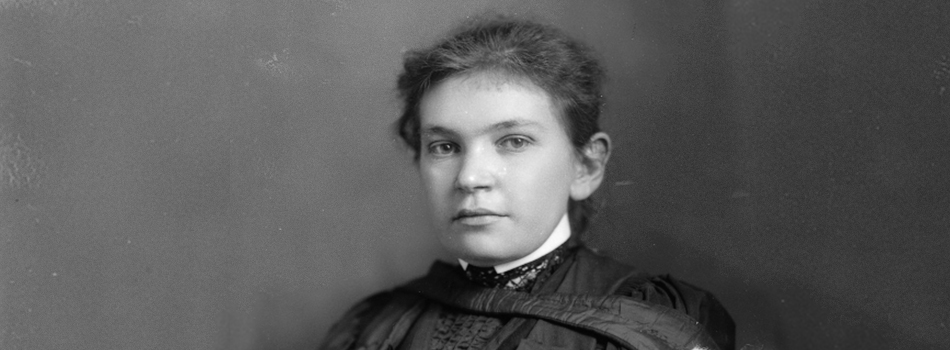
Maude Abbott was born in 1868 in St. Andrews East, Quebec. Because of the death of her mother, she was raised by her grandmother. She was one of the first women to obtain a bachelor's degree in arts from McGill University.
After being refused admission to the McGill Medical School, she attended Bishop's College, from which she received her medical degree in 1894, taking the Senior Prize in anatomy and the Chancellor's Prize for the best examination in the final sessions.
Following postgraduate studies in Europe, she returned to Montreal where she met the Chair of Pathology at McGill University, Dr. George Adami. In 1898, Adami appointed her Assistant Curator of the Medical Museum and sent her to Washington to study the methods of the Army Medical Museum. During her trip, she met William Osler at Johns Hopkins and as she wrote in 1928:
"He quietly dropped the seed that dominated all my future work... (the) museum work was very demanding and seemed at first a dreary and unpromising drudgery, but, as Dr. Osler had prophesied, it blossomed into wonderful things."
Osler subsequently asked her to write the section on congenital heart disease for his System of Medicine. Her work on this and other projects culminated in her 1936 Atlas of Congenital Cardiac Disease.
Abbott’s teaching at the Medical Museum began informally in 1901, when Adami suggested to students that those who wished to have specimens demonstrated “should arrange to meet with (Abbott) at hours mutually suitable.” Soon, the entire final year class had enrolled in groups on a weekly rotation and, by 1904, “museum demonstration” had become part of the medical school curriculum.
In 1924, the Pathology Department and its Museum were transferred from the Strathcona Medical Building (the site of Abbott’s Museum) and the day-to-day management of the museum, including the accessioning and preparation of specimens and their use in teaching, was taken away from Abbott, who became Curator of the newly named “Central” Medical Museum. Although she continued to acquire specimens related to congenital cardiac disease, her teaching responsibilities were essentially eliminated. In 1932, the Central Museum was renamed the “Museum of Medical History.” McGill officially established the Maude Abbott Medical Museum in 2012.
Dr. Richard Fraser, Director of the Maude Abbott Medical Museum, takes you on a virtual tour of the museum, one of the oldest teaching units in the Faculty of Medicine and Health Sciences.
In addition to her work at the McGill Museum, Abbott was a founder of the Federation of Medical Women of Canada in 1924 and of the International Association of Medical Museums (now known as the International Academy of Pathology) in 1906.
McGill University awarded her an honorary MDCM in 1910, and, at her retirement in 1936, an honorary degree which recognized her as "a stimulating teacher, an indefatigable investigator and a champion of higher education." Abbott died in Montreal on September 2, 1940.
Source: https://www.mcgill.ca/medicalmuseum/introduction/history/physicians/abbott